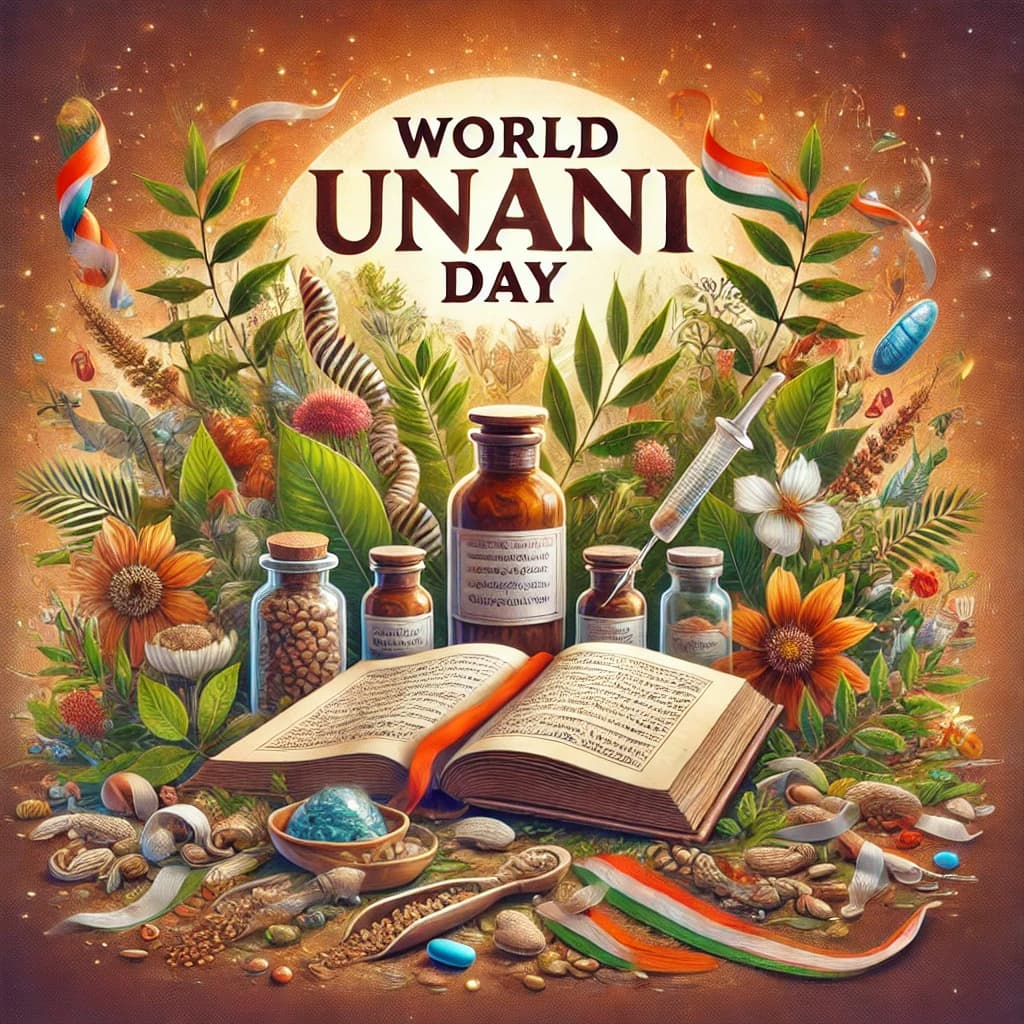9th World Unani Day: Honoring Hakim Ajmal Khan & the Timeless Wisdom of Holistic Healing


Introduction
Every year on February 11, the global community commemorates World Unani Day, a celebration of one of the world’s oldest healthcare systems and its enduring legacy. In 2025, we mark the 9th anniversary of this occasion, dedicated to honoring Hakim Ajmal Khan—the visionary who revolutionized Unani medicine in India—and reflecting on the system’s timeless principles. This blog delves into the history, significance, and modern relevance of Unani medicine, while highlighting the 2025 theme: “Innovations in Unani Medicine for Integrative Health Solutions – A Way Forward” .
A physician, educator, and freedom fighter, he:
Founded institutions like Tibbia College and Jamia Millia Islamia to institutionalize Unani education.
Established the Hindustani Dawakhana in 1905, a landmark facility for Unani and Ayurvedic medicines.
Championed resistance against colonial policies that threatened traditional medicine systems.
His birth anniversary, February 11, was declared World Unani Day in 2016 by India’s Ministry of AYUSH, cementing his role as a global icon of holistic healthcare.
Origins and Evolution of Unani Medicine
Unani medicine (or Unani Tibb) traces its roots to ancient Greece, where Hippocrates (460–370 BCE), the Father of Medicine, laid its foundation. The term “Unani” derives from the Arabic Yunani (Greek), reflecting its Hellenistic origins. Over centuries, it evolved through contributions from Islamic scholars like Ibn Sina (Avicenna), whose Canon of Medicine became a cornerstone of medical practice.
Key Historical Milestones:
Spread to India: Arab and Persian scholars introduced Unani to the Indian subcontinent during the 12th–13th centuries, where it flourished under Islamic rulers.
Integration with Local Traditions: Unani absorbed elements from Egyptian, Chinese, and Indian systems, creating a unique blend of Greco-Arabic and indigenous knowledge.
Modern Recognition: Today, Unani is officially recognized under India’s AYUSH framework and the World Health Organization (WHO) as a viable alternative healthcare system.
Core Principles of Unani Medicine
Unani’s holistic philosophy emphasizes balance among the body, mind, and soul. Key principles include:
The Four Humors: Health depends on equilibrium between blood, phlegm, yellow bile, and black bile.
Seven Natural Components (Umure Tabiya): Elements, temperament, humors, organs, vital spirit, faculties, and functions govern well-being.
Preventive Care: Prioritizing Baqa-e-Sehath (preservation of health) through diet, exercise, and ecological harmony.
Diagnostic Methods:
Nabz (pulse analysis), Baul (urine examination), and Baraz (stool assessment) are used to identify imbalances.
World Unani Day 2025: Innovations and Global Collaboration
This year’s theme underscores the fusion of traditional wisdom with modern science. Key events include:
International Conference in New Delhi: Inaugurated by President Droupadi Murmu, the conference features scientific sessions on AI integration, herbal pharmaceuticals, and global health partnerships.
Awards and Recognitions: CCRUM (Central Council for Research in Unani Medicine) honored researchers and institutions for breakthroughs in Unani therapeutics.
Exhibitions: Showcasing innovations like Unani-based treatments for chronic diseases and skin disorders.
Global Participation: Delegates from the USA, Iran, UAE, and other nations highlighted Unani’s role in addressing contemporary health challenges, including non-communicable diseases.
Challenges and the Path Forward
While Unani thrives, challenges persist:
Endangered Medicinal Plants: Over 90% of herbs used in Jammu and Kashmir’s Unani practices are at risk, prompting conservation efforts like nurseries in Doda and Kishtwar.
Integration with Modern Healthcare: Initiatives like the National Accreditation Board certifications aim to standardize Unani institutions and enhance credibility.
Conclusion: Embracing a Holistic Future
World Unani Day is not just a tribute to Hakim Ajmal Khan but a call to embrace integrative healthcare. At Aferz Herbals, we align with this vision, crafting natural remedies rooted in Unani’s timeless wisdom. As we celebrate 2025, let us champion innovation while preserving the essence of a system that has healed generations.
Explore the power of Unani with Aferz Herbals—where tradition meets tomorrow.
References: Ministry of AYUSH, CCRUM, PIB, and historical archives. For more details, visit Aferz Herbals’ Unani Resources.
This blog synthesizes information from government releases, historical records, and expert analyses. All facts are cited to their original sources.
The Legacy of Hakim Ajmal Khan
Hakim Ajmal Khan (1868–1927) is revered as the Father of Unani Medicine in
India for his tireless efforts to preserve and modernize this ancient system.
